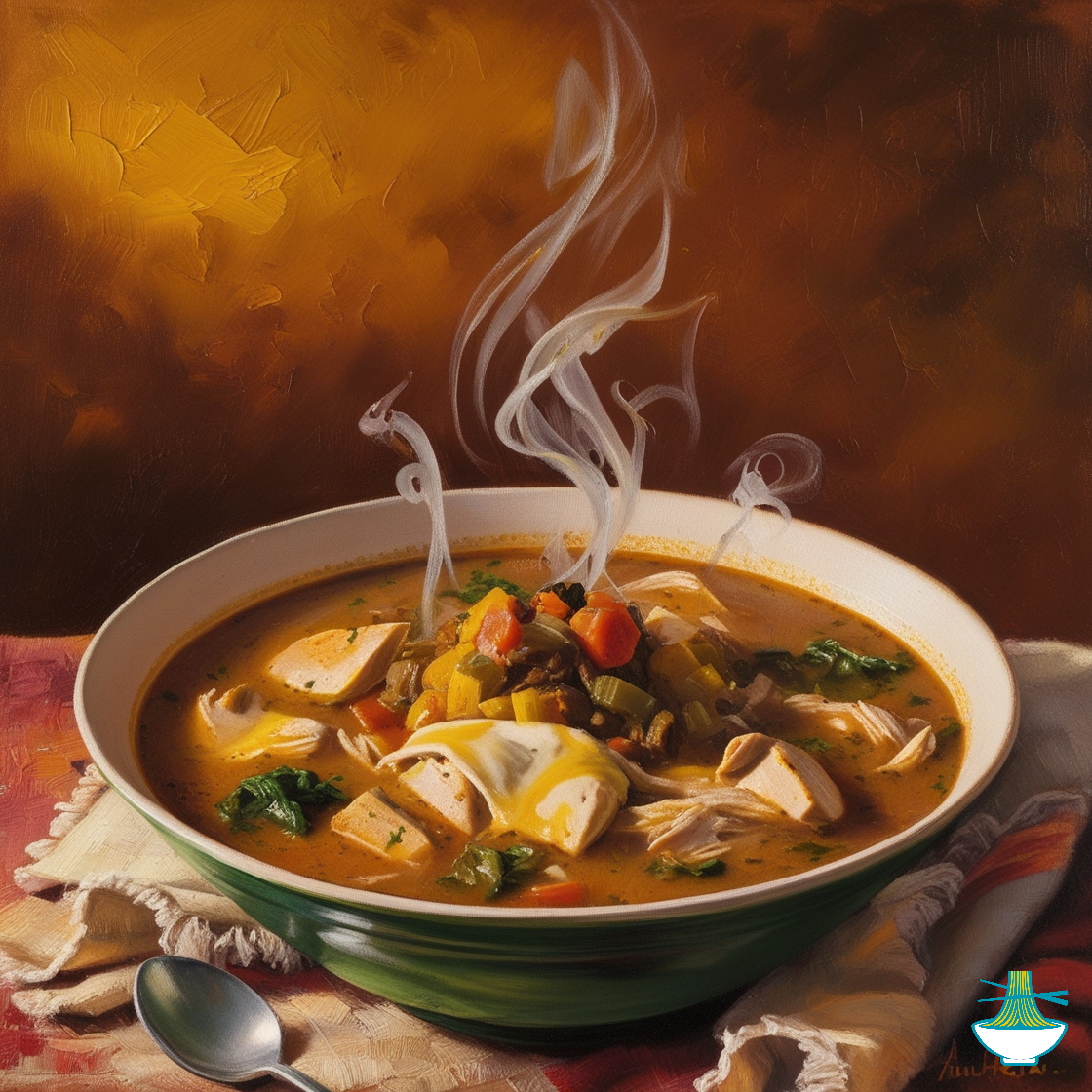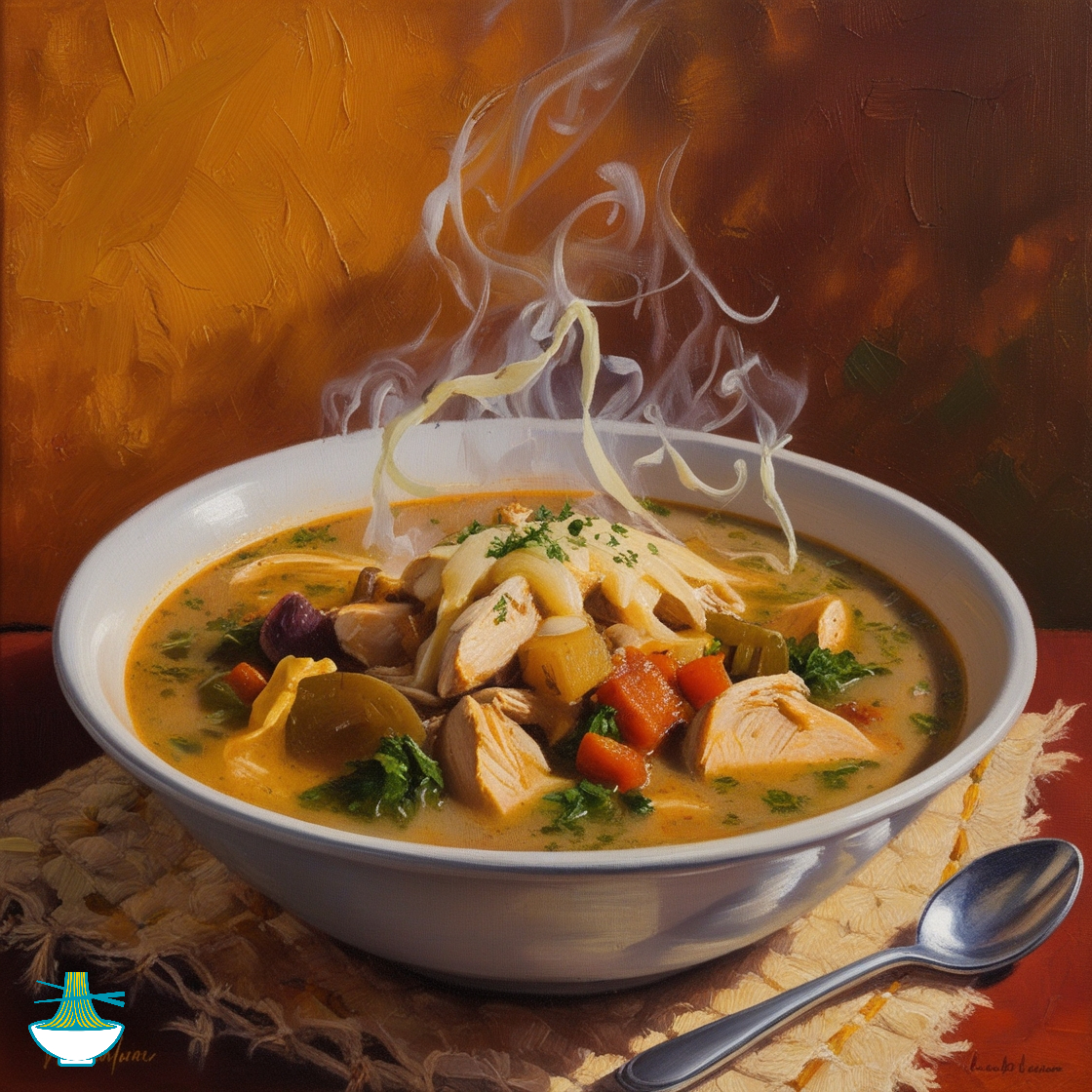Chupe Andino, a creamy and flavorful traditional soup from the Andes, particularly Peru and Bolivia , reflects the rich culinary heritage of the Andean region .
The recipe typically includes chicken as the primary protein, combined with cheese, vegetables like potatoes, corn, and peas, and seasoned with herbs and spices. The soup is cooked to a creamy consistency, often with the addition of milk or cream, creating a hearty and comforting dish.
Historically, Chupe Andino reflects the fusion of indigenous ingredients with Spanish influences, showcasing a blend of flavors that define Andean cuisine. It has evolved over time, with variations that incorporate local ingredients and regional cooking techniques, making it a beloved dish that represents the cultural diversity and culinary heritage of the Andean region.
Ingredients:
- 1 pound boneless, skinless chicken breasts, diced
- 2 cups chicken broth
- 1 cup milk
- 1 cup shredded mozzarella cheese
- 2 potatoes, peeled and diced
- 1 cup corn kernels (fresh or frozen)
- 1 cup peas (fresh or frozen)
- 1 onion, chopped
- 2 cloves garlic, minced
- 2 tablespoons olive oil
- Salt and pepper to taste
- Fresh cilantro or parsley for garnish (optional)

Method of Preparation:
1. In a large pot, heat olive oil over medium heat. Add chopped onion and minced garlic, and sauté until softened.
2. Add diced chicken to the pot and cook until browned on all sides.
3. Pour in chicken broth and milk, and bring to a simmer.
4. Add diced potatoes, corn kernels, and peas to the pot. Season with salt and pepper to taste.
5. Cover the pot and let the soup simmer for about 15-20 minutes or until the potatoes are tender.
6. Stir in shredded mozzarella cheese until melted and well combined.
7. Taste and adjust seasoning if needed.
8. Serve hot, garnished with fresh cilantro or parsley if desired.
This recipe is designed to be easy to follow and understand, suitable for both beginners and experienced cooks.
Nutrition Value:
1. Boneless, Skinless Chicken Breasts (1 pound, diced):
- Calories: Approximately 540 calories
- Carbohydrates: Negligible
- Protein: About 120 grams
- Fat: Around 6 grams
- Sodium: Varies based on preparation
- Cholesterol: About 240 milligrams
- Vitamins: Rich in vitamin B6 and niacin
- Minerals: Contains phosphorus, selenium, and small amounts of iron and zinc
- Nutritional Benefit: High-quality protein source, low in fat (especially when skinless), and a good source of essential vitamins and minerals.
2. Chicken Broth (2 cups):
- Calories: Around 10-20 calories (depending on brand or homemade)
- Carbohydrates: Negligible
- Protein: Around 1-2 grams
- Fat: Negligible
- Sodium: Can vary significantly; low-sodium options are available
- Cholesterol: Negligible
- Vitamins: Contains small amounts of B vitamins
- Minerals: May contain some minerals like potassium
- Nutritional Benefit: Provides flavor and moisture to dishes with minimal calories, suitable for hydration.
3. Milk (1 cup):
- Calories: Approximately 120 calories (whole milk)
- Carbohydrates: About 12 grams
- Protein: Around 8 grams
- Fat: About 7 grams
- Sodium: Varies; generally low in natural milk
- Cholesterol: About 24 milligrams
- Vitamins: Good source of calcium, vitamin D, and riboflavin
- Minerals: Contains phosphorus and potassium
- Nutritional Benefit: Rich in calcium for bone health and a source of essential nutrients like vitamin D and protein.
4. Shredded Mozzarella Cheese (1 cup):
- Calories: Approximately 320 calories
- Carbohydrates: About 2 grams
- Protein: Around 20 grams
- Fat: About 25 grams
- Sodium: About 600 milligrams
- Cholesterol: About 85 milligrams
- Vitamins: Contains vitamin A and calcium
- Minerals: Rich in calcium and phosphorus
- Nutritional Benefit: Good source of protein and calcium, but higher in fat and sodium, so moderate consumption is recommended.
5. Potatoes (2, peeled and diced):
- Calories: Approximately 200 calories
- Carbohydrates: About 45 grams
- Protein: About 5 grams
- Fat: Negligible
- Sodium: Varies; low in natural form
- Cholesterol: Negligible
- Vitamins: Excellent source of vitamin C and potassium
- Minerals: Contains potassium and small amounts of magnesium and iron
- Nutritional Benefit: Good source of complex carbohydrates, potassium, and vitamin C, beneficial for energy and immune function.
6. Corn Kernels (1 cup, fresh or frozen):
- Calories: Around 100-130 calories
- Carbohydrates: About 20-30 grams
- Protein: About 3-5 grams
- Fat: About 1-2 grams
- Sodium: Varies; typically low
- Cholesterol: Negligible
- Vitamins: Contains vitamin C, folate, and vitamin A
- Minerals: Rich in magnesium and phosphorus
- Nutritional Benefit: Good source of fiber, vitamins, and minerals, beneficial for digestion and overall health.
7. Peas (1 cup, fresh or frozen):
- Calories: Approximately 60-80 calories
- Carbohydrates: About 10-15 grams
- Protein: About 4-5 grams
- Fat: Negligible
- Sodium: Varies; generally low
- Cholesterol: Negligible
- Vitamins: Contains vitamin K, vitamin C, and folate
- Minerals: Rich in potassium and magnesium
- Nutritional Benefit: High in fiber, protein, and various vitamins and minerals, contributing to a balanced diet.
8. Onion (1, chopped):
- Calories: Around 40 calories
- Carbohydrates: About 10 grams
- Protein: About 1 gram
- Fat: Negligible
- Sodium: Varies; naturally low
- Cholesterol: Negligible
- Vitamins: Good source of vitamin C and vitamin B6
- Minerals: Contains potassium and small amounts of iron and calcium
- Nutritional Benefit: Provides flavor and antioxidants, and contributes to overall vegetable intake.
9. Garlic (2 cloves, minced):
- Calories: Approximately 10-15 calories
- Carbohydrates: About 2-3 grams
- Protein: About 0.5 grams
- Fat: Negligible
- Sodium: Negligible
- Cholesterol: Negligible
- Vitamins: Contains vitamin C, vitamin B6, and manganese
- Minerals: Rich in sulfur compounds and antioxidants
- Nutritional Benefit: Known for potential immune-boosting and antioxidant properties, adds flavor to dishes.
10. Olive Oil (2 tablespoons):
- Calories: Around 240 calories
- Carbohydrates: Negligible
- Protein: Negligible
- Fat: About 28 grams (mostly monounsaturated fats)
- Sodium: Negligible
- Cholesterol: Negligible
- Vitamins: Contains vitamin E and vitamin K
- Minerals: Rich in antioxidants and beneficial fatty acids
- Nutritional Benefit: Source of healthy fats, particularly monounsaturated fats, which may support heart health and provide antioxidants.
11. Salt and Pepper (to taste):
- Calories: Negligible
- Carbohydrates: Negligible
- Protein: Negligible
- Fat: Negligible
- Sodium: Varies based on usage; moderate consumption recommended
- Cholesterol: Negligible
- Vitamins: Negligible
- Minerals: Contains sodium and trace minerals
- Nutritional Benefit: Enhances flavor but should be used in moderation to manage sodium intake.
12. Fresh Cilantro or Parsley for Garnish (optional):
- Calories: Negligible
- Carbohydrates: Negligible
- Protein: Negligible
- Fat: Negligible
- Sodium: Negligible
- Cholesterol: Negligible
- Vitamins: Contains vitamin K, vitamin A, and vitamin C
- Minerals: Small amounts of calcium and iron
- Nutritional Benefit: Adds freshness and visual appeal to dishes, and may provide some vitamins and minerals.


Comments